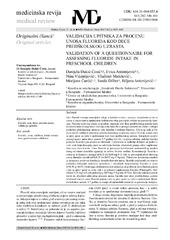Fluoride, urine, children, intake estimation, questionnaire validation
Validacija upitnika za procenu unosa fluorida kod dece predškolskog uzrasta
| dc.creator | Đukić-Ćosić, Danijela | |
| dc.creator | Antonijević, Evica | |
| dc.creator | Vićentijević, Nina | |
| dc.creator | Malešević, Vladimir | |
| dc.creator | Ćurčić, Marijana | |
| dc.creator | Dilber, Sanda | |
| dc.creator | Antonijević, Biljana | |
| dc.date.accessioned | 2019-09-02T11:56:58Z | |
| dc.date.available | 2019-09-02T11:56:58Z | |
| dc.date.issued | 2017 | |
| dc.identifier.issn | 1821-1585 | |
| dc.identifier.uri | https://farfar.pharmacy.bg.ac.rs/handle/123456789/2780 | |
| dc.description.abstract | Although fluoride doesn't have essential function in human growth and development, it is important to be taken in optimal amounts for caries preventive effects. Estimation of fluoride intake is especially important in preschool children when it comes to massive growth and development of the teeth in order to achieve caries protection and to avoid side effects if taken in excessive amounts (dental and skeletal fluorosis). The aim of this study was to determine the validity of a questionnaire created for assessment of fluoride intake through drinking water, toothpaste and fluoride supplements among preschool children. The first morning urine samples were collected from children aged 3 to 7 years (n=16). Fluoride concentrations in these samples were determined by fluoride ion-specific electrode. The questionnaires for parents were used to obtain data about the type of water and toothpaste, frequency of tooth brushing and fluoride supplements that children have used. Fluoride intake was estimated using a mathematical model given by the US Agency for Environ - mental Protection. Fluoride concentrations in urine were within 0.16-0.68 mg F-/L, while estimated daily intake levels of fluorides were within 0.0125-0.033 mg F-/kg/day. Using correlation analysis positive correlation between daily intake of fluorides, calculated on the basis of questionnaire data, and determined fluoride concentrations in urine was shown (r=0.59, p lt 0.05). However, the obtained results show that estimated daily fluoride intakes through drinking water and toothpaste, even including fluoride supplements (Fluorogal®, NaF, tablets 0.25 mg) were lower than adequate intake (0.05 mg F-/kg/day, EFSA ). Created questionnaire could provide adequate assessment of fluoride intake in preschool children. Calculated daily intakes of fluorides through drinking water, toothpaste and fluoride supplements for children aged 3 to 7 years were lower than optimal intakes for caries prevention effect. | en |
| dc.description.abstract | Iako fluoridi nemaju esencijalnu ulogu u ljudskom rastu i razvoju, neophodno je da se unose u organizam u optimalnim količinama zbog povoljnih efekata na prevenciju karijesa. Procena njihovog unosa je posebno značajna kod dece predškolskog uzrasta kada dolazi do intenzivnog rasta i razvoja zuba kako bi se postigli preventivni efekti i izbegle posledice prekomernog unosa u vidu dentalne i skeletne fluoroze. Cilj ovog rada je bio da se utvrdi validnost anketnog upitnika kreiranog za procenu unosa fluorida putem vode za piće, paste za zube i suplemenata kod dece predškolskog uzrasta. Sakupljeni su prvi jutarnji uzorci urina dece uzrasta 3-7 godina (n=16) i u njima određen sadržaj fluorida pomoću fluoridne jon-selektivne elektrode. Upitnicima za roditelje dobijeni su podaci o vrsti vode koju deca piju, pasti za zube koju koriste, učestalosti pranja zuba i suplementima koje deca koriste. Unos fluorida je procenjen korišćenjem matematičkog modela datog od strane Američke agencije za zaštitu životne sredine. Koncentracije fluorida u urinu su se kretale u opsegu od 0,16 do 0,68 mg F-/L dok su procenjeni nivoi dnevnog unosa fluorida iznosili od 0,0125 do 0,033 mg F-/kg/dan. Primenom korelacione analize je pokazana pozitivna korelacija između dnevnih unosa fluorida izračunatih na osnovu podataka dobijenih anketnim upitnikom i određenih koncentracija fluorida u urinu (r=0,59, p lt 0,05). Osim toga, dobijeni rezultati pokazuju da je dnevni unos fluorida putem vode za piće i paste za zube, čak i uz primenu suplemenata fluorida (Fluorigal®, NaF, tablete 0,25 mg) niži od optimalnog (0,05 mg F-/kg/dan, EFSA). Kreirani anketni upitnik može da obezbedi adekvatnu procenu unosa fluorida kod dece predškolskog uzrasta. Izračunati dnevni unosi fluorida putem vode za piće, paste za zube i suplemenata fluorida kod dece uzrasta 3-7 godina su manji od optimalnih vrednosti za prevenciju karijesa. | sr |
| dc.publisher | Most Art doo, Beograd | |
| dc.relation | info:eu-repo/grantAgreement/MESTD/Integrated and Interdisciplinary Research (IIR or III)/46009/RS// | |
| dc.rights | openAccess | |
| dc.source | MD - Medical data | |
| dc.subject | fluoride | en |
| dc.subject | urine | en |
| dc.subject | children | en |
| dc.subject | intake estimation | en |
| dc.subject | questionnaire validation | en |
| dc.subject | fluoridi | sr |
| dc.subject | urin | sr |
| dc.subject | deca | sr |
| dc.subject | procena unosa | sr |
| dc.subject | validacija upitnika | sr |
| dc.title | Fluoride, urine, children, intake estimation, questionnaire validation | en |
| dc.title | Validacija upitnika za procenu unosa fluorida kod dece predškolskog uzrasta | sr |
| dc.type | article | |
| dc.rights.license | ARR | |
| dcterms.abstract | Ђукић-Ћосић, Данијела; Малешевић, Владимир; Вићентијевић, Нина; Ћурчић, Маријана; Aнтонијевић, Биљана; Дилбер, Санда; Aнтонијевић, Евица; Валидација упитника за процену уноса флуорида код деце предшколског узраста; Валидација упитника за процену уноса флуорида код деце предшколског узраста; | |
| dc.citation.volume | 9 | |
| dc.citation.issue | 2 | |
| dc.citation.spage | 95 | |
| dc.citation.epage | 100 | |
| dc.citation.other | 9(2): 95-100 | |
| dc.citation.rank | M52 | |
| dc.identifier.fulltext | http://farfar.pharmacy.bg.ac.rs/bitstream/id/11581/Fluoride_urine_children_pub_2017.pdf | |
| dc.identifier.rcub | https://hdl.handle.net/21.15107/rcub_farfar_2780 | |
| dc.type.version | publishedVersion |

